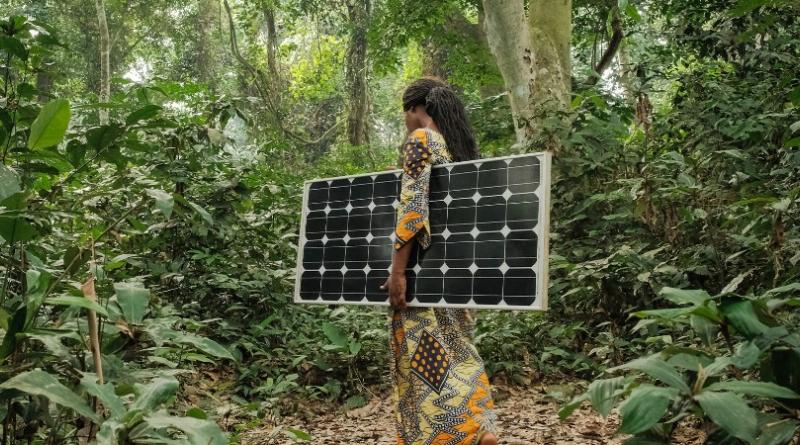Can carbon markets solve Africa’s climate finance woes?

- The African Carbon Markets Initiative, a consortium of Global North donors, corporate representatives, conservation groups and energy lobbyists, is pushing to expand carbon markets on the continent.
- The effort has gained the vocal support of Kenyan President William Ruto, along with a number of other African heads of state, who see carbon markets as a way to generate badly needed climate finance.
- But African environmental groups have sharply criticized carbon markets, saying they represent a “false solution” to the climate crisis and will mostly enrich bankers and traders based outside the continent.
- The drive to scale up carbon markets in Africa and elsewhere is set to be a major agenda item at this month’s COP28 climate summit in Dubai.
At the COP28 climate summit set to be held in the oil-rich United Arab Emirates later this month, carbon markets are sure to be high on the agenda. And some African leaders are hoping to capitalize. The Africa Carbon Markets Initiative (ACMI), a consortium of Global North donors, corporate representatives, conservation groups, and energy lobbyists, says those markets could plug the continent’s climate finance gaps and fund a green transition. But African environmental groups say they’re a “false solution” to the climate crisis that will bring familiar troubles without leaving much of value behind.
In September, Kenyan President William Ruto hosted heads of state and other dignitaries from across the continent at the first Africa Climate Week, a showcase for “green growth” initiatives like the ACMI and other “practical solutions to climate change.” The continent’s potential to increase its cut of global carbon markets was at the forefront of the summit, with the ACMI saying they could generate as much as $50 billion per year for African governments while creating tens of millions of jobs.
But in a statement released in the summit’s run-up, more than 500 African civil society groups countered by saying that carbon markets would instead “embolden wealthy nations and large corporations to continue polluting the world, much to Africa’s detriment.”
The sharply worded statement reflected a deep divide over carbon markets on the continent. To their supporters, carbon projects have the potential to attract investment that could be used to finance an array of green development needs, from the expansion of clean energy access to forest conservation and beyond. But their critics say they’re a distraction from the real work of decarbonization, and that they’re more likely to make a handful of people rich than to make any dent in the climate crisis, which is already hitting Africa hard from all sides.
“Instead of dealing with pollution from companies and countries that are actually causing the climate crisis, which would require them to cut down on their carbon footprint, [with carbon markets] they can continue with their emissions as long as they pay some meager amount of money to Global South countries,” said Omar Elmawi, a Kenyan environmental activist and member of a coalition of groups that oppose the ACMI.

Band-aids for broken promises
Despite promising to provide $100 billion per year to help African countries prepare for and address the impacts of climate change, wealthy countries are currently contributing less than a third of that figure, according to the Climate Policy Institute — leaving the continent well short of the $2.4 trillion it needs to meet its Paris Agreement targets by 2030.
The ACMI says that carbon markets can help fill that gap. By passing new legislation that smooths the way for carbon projects, African governments would be able to attract cash from corporations and governments looking to “offset” their carbon emissions.
According to the ACMI, those funds could be directed toward a range of climate-friendly projects. A European airline company, for example, could compensate for jet fuel emissions by buying credits from a firm that swaps household cookstoves out for models that purportedly burn charcoal more efficiently in Uganda. Or a city government looking to meet its “net-zero” target might purchase credits on an open market that were produced by a rainforest conservation initiative in the Congo Basin, thereby sending money towards that project.
Managers of those projects would need to hire staff to supervise them, and governments would get a cut of the revenue generated by the sale of their credits.
“A flourishing carbon credit ecosystem can support job creation, bring in investment, and increase fiscal revenue,” Paul Muthaura, CEO of the ACMI, said in a statement emailed to Mongabay.
The ACMI is aiming for staggering growth, saying it wants to increase the number of credits generated on the continent twentyfold over the next decade. Those plans have drawn vocal support from Ruto, along with other leaders in and outside the continent. During September’s summit, a group of investors from the UAE committed to buying $450 million in carbon credits from the ACMI.
But climate activists on the continent have come out swinging against the ACMI and its plans.

In September, Kenya-based Power Shift Africa released a report describing carbon credits as “pollution permits” and a gift to oil companies, saying those companies would use them to dodge accountability for their role in causing global warming and carry on with business as usual. The group said the ACMI’s job and revenue projections don’t hold up to close scrutiny, and the primary beneficiaries of carbon markets would most likely be bankers and traders outside the continent.
Many credit-generating projects, it warned, would be plantations that grow nonnative tree species on vast tracts of land, in some cases destroying preexisting ecosystems. In countries with weak land laws or poor protections for Indigenous groups, rural Africans could be pushed off that land in order to sell lucrative credits to Western and other corporations. In other cases, deforestation offsets could put burdensome restrictions on forest access for local people.
“To make companies and brokers that are involved in carbon markets happy, many times the communities that are dependent on forests for their livelihoods will become collateral damage,” Elmawi said.
Earlier this year, Mongabay obtained a draft contract between the UAE-based firm Blue Carbon and the government of Liberia, which would convert nearly 10% of the West African country’s area into a carbon credit-generating landscape under the firm’s control. According to the Liberia-based Sustainable Development Institute, communities living on that land said they hadn’t been consulted or informed of the deal’s terms.
And on Monday, the Kenya Human Rights Center released a scathing report accusing employees of the U.S.-based Wildlife Works of widespread sexual assault and harassment at a celebrated REDD+ credit-generating project in Kenya. Credits from the Kasigau wildlife project, often described as a flagship example for carbon markets on the continent, were said to have been purchased by Shell, Netflix, Gucci, and other corporations.

Crisis and opportunity
One of the major obstacles the ACMI says is holding back carbon market growth in Africa is the relatively small number of firms running credit-generating projects on the continent. Between 2016 and 2021, only 10% of carbon credits issued globally originated in an African country, most of which were listed by only 15 firms. The ACMI wants more African firms to enter the market, and for them to expand into multiple countries at once.
One example of what those new firms could look like is the African Forestry Impact Platform. AFIP was set up in 2022 by the Australian developer New Forests, with the explicit goal of exploiting Africa’s untapped potential to generate carbon credits.
New Forests itself is owned by two Japanese firms: Mitsui & Co. and Nomura Holdings. According to the Oakland Institute, a U.S.-based advocacy group, Mitsui is the fifth-largest upstream oil and gas developer in Africa.
A report the group released in September said AFIP received $200 million from a consortium of European development banks in order to set up carbon projects on the continent. To get those projects up and running, AFIP bought the Norwegian forestry company Green Resources, which operated 38,000 hectares (94,000 acres) of carbon credit-generating eucalyptus and pine plantations in Mozambique, Tanzania and Uganda.
But Green Resources’ plantation in Uganda has been marred by conflict with communities, who say their land was grabbed to facilitate its development. After an investigation by a Swedish media outlet in 2015, the Swedish Energy Agency froze a $4 million deal to buy credits generated by the plantation.

Oakland Institute researchers say the problems associated with the plantation are emblematic of what’s likely to go wrong in a rapid scale-up of carbon markets on the continent.
“When you see the actors behind the AFIP scheme you get really concerned, because you see some major Western government agencies who are [involved] in the climate response, including Norfund and the British International Investment,” said Frederic Mousseau, policy director at the Oakland Institute. “And then you see the oil industry, which is of course behind all this expansion of carbon markets and a key purchaser of credits.”
Mousseau also questioned whether the company’s plantations would last for the 100 years needed for any carbon sequestration to be permanent.
“The IPCC themselves say this type of scheme is definitely not the solution to reducing emissions, so it’s shocking that this kind of agenda is being pushed,” he said.
In an email to Mongabay, Lauren Stewart of New Forests said there were “numerous inaccuracies” in the Oakland Institute report, and that before releasing it the group didn’t engage with the company or try to “gain an understanding of our business, our track record, or our intentions in Africa or any other part of the world where we operate.”
“Sustainable plantation forests play an important role in conserving natural forests, improving degraded lands, generating employment opportunities, and contributing positively to the environment and communities,” she wrote.

Buyers beware?
Accomplishing the kind of growth in carbon markets the ACMI wants to see on the continent won’t come easily. Along with what it describes as challenges in raising capital to finance carbon projects in Africa, it’s been a bad year for the reputation of carbon credits overall, with corporate buyers now skittish after a flood of negative media coverage.
In January, an investigation by The Guardian suggested that almost 90% of forest carbon credits issued by Verra, the world’s leading offset certifier, were “worthless” and had little to no positive impact on the climate. Verra disputed the claim, but its CEO resigned not long after the report was published. And earlier this year ,the firm suspended the issuance of credits from a major project in Kenya in the midst of questions over its methodology and implementation.
Mongabay’s reporting has shown that the terms of major carbon projects can be opaque and the actors involved unclear, leaving buyers open to the possibility of nasty surprises. News agency AFP reported that between January 2022 and mid-October 2023, the price of credits generated by conservation projects dropped from $18 per metric ton to less than $2.
Critics of the ACMI in Africa say those kinds of price fluctuations could lead to abandoned projects and unmet expectations in communities. Such projects would create the illusion of climate progress while helping to justify delaying a crucial — and significantly tougher — decarbonization push the IPCC says is unavoidable. If poorly regulated, developers, consultants and brokers in credit markets could rake in profits from failed projects, while the consequences of those failures would be felt most acutely by people dealing with the worst impacts of climate change, and in whose name the credits were sold in the first place.
“Africa is being asked to take on the burden of climate action in favor of Global North countries, which is unfair and wrong,” Elmawi said. “In many ways it’s a continuation of colonial thinking.”
Banner image: Woman carrying a solar panel near Yangambi, DRC. Image by Axel Fassio/CIFOR via Flickr (CC BY-NC-ND 2.0).






